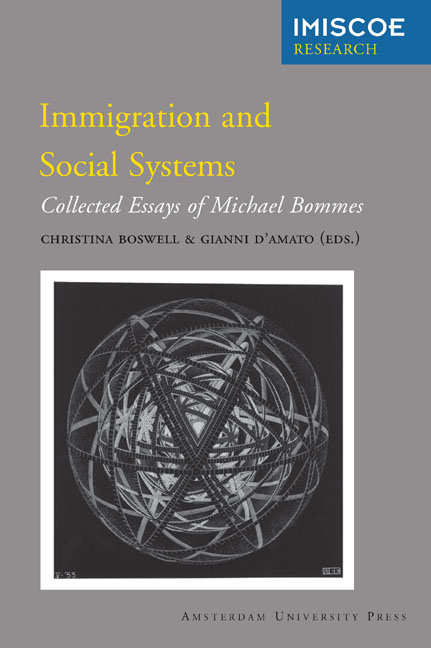Book contents
- Frontmatter
- Contents
- Foreword
- Preface
- Introduction
- 1 Migration in Modern Society
- 2 National Welfare State, Biography and Migration: Labour Migrants, Ethnic Germans and the Re-Ascription Of Welfare State Membership
- 3 Systems Theory and the ‘Ethnic Inequality’ of Migrant Workers
- 4 Welfare Systems and Migrant Minorities: The Cultural Dimension of Social Policies and its Discriminatory Potential
- 5 Transnationalism or Assimilation?
- 6 ‘Integration takes Place Locally’: On the Restructuring of Local Integration Policy
- 7 Illegal Migration in Modern Society: Consequences and Problems of National European Migration Policies
- 8 General and Specific Characteristics of Networks: (with Veronika Tacke)
- 9 National Paradigms of Migration Research: (with Dietrich Thränhardt)
- References
- Other IMISCOE Titles
5 - Transnationalism or Assimilation?
Published online by Cambridge University Press: 09 January 2021
- Frontmatter
- Contents
- Foreword
- Preface
- Introduction
- 1 Migration in Modern Society
- 2 National Welfare State, Biography and Migration: Labour Migrants, Ethnic Germans and the Re-Ascription Of Welfare State Membership
- 3 Systems Theory and the ‘Ethnic Inequality’ of Migrant Workers
- 4 Welfare Systems and Migrant Minorities: The Cultural Dimension of Social Policies and its Discriminatory Potential
- 5 Transnationalism or Assimilation?
- 6 ‘Integration takes Place Locally’: On the Restructuring of Local Integration Policy
- 7 Illegal Migration in Modern Society: Consequences and Problems of National European Migration Policies
- 8 General and Specific Characteristics of Networks: (with Veronika Tacke)
- 9 National Paradigms of Migration Research: (with Dietrich Thränhardt)
- References
- Other IMISCOE Titles
Summary
In their analyses of the recent structural effects of international migration, both multiculturalists and transnationalists have criticized the classical frame of analysis in migration research. They argue that the analysis of assimilation processes does not adequately take into account recent processes of cultural pluralisation and the emergence of transnational spaces. This is mainly attributed to assimilation theorists’ understanding of society as a nationally closed container, which is seen as one of the problematic assumptions of this approach.
Unsurprisingly, this is seen very differently by researchers interested in assimilation processes (and for reasons of simplification we call them from now on assimilationists) who argue that the paradigm of assimilation research is still the most adequate frame of analysis. They argue that it is still possible and useful to describe even the most recent migration phenomena and the consequences linked with them as ongoing assimilation processes. Hartmut Esser even claims that for migrants there is no serious alternative to assimilation. Access to the most important social resources has become increasingly dependent on access to and success in education, and the different education systems are fundamentally shaped by different national traditions and languages.
Ewa Morawska has attempted to adopt a more moderate position in this debate between assimilationists on the one hand and transnationalists and multiculturalists on the other. She has argued that all processes of migration are linked with processes of assimilation as well as with the emergence of transnational structures. In her view migration research is faced with the task of describing the various migrations and the consequences linked with them as different combinations of transnational and assimilative structures and building typologies of these combinations.
In contrast to these positions, this paper argues that the debate between assimilationists and transnationalists is based on a false opposition. This is mainly due to the use of unclarified theoretical frames of analysis. The central aim is to demonstrate that the arguments of transnationalists and assimilationists can be systematically reconstructed as two different hypotheses about the structural consequences of recent international migration. If the two hypotheses are formulated within one common and coherent theoretical framework of analysis, it can be shown that assimilationism and transnationalism do not necessarily refer to different research approaches but rather to two different and competitive hypotheses about the effects of international migration that, as such, are open to empirical tests.
- Type
- Chapter
- Information
- Immigration and Social SystemsCollected Essays of Michael Bommes, pp. 107 - 124Publisher: Amsterdam University PressPrint publication year: 2013
- 1
- Cited by



